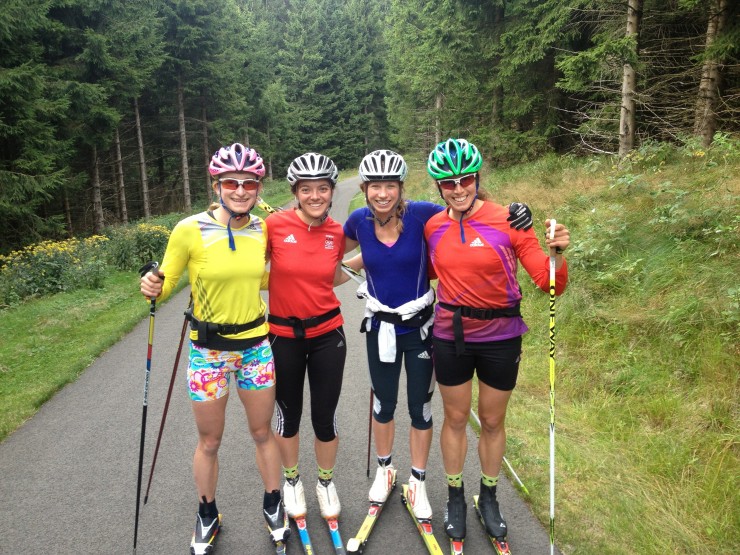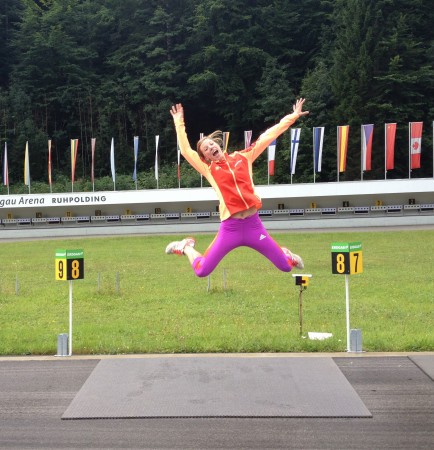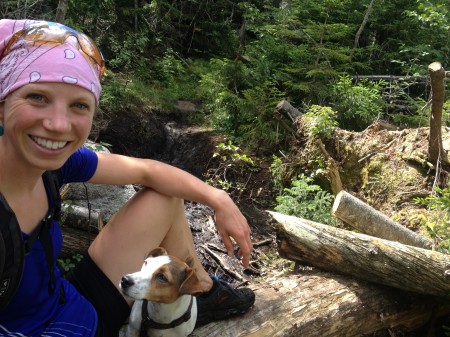
On the World Cup, results can be tracked year by year, and intimidation and nerves drop away as athletes become acclimated to the scene. But training camps can function in the same way, and on her third summer trip to Ruhpolding, Germany, with the national team, U.S. biathlete Annelies Cook appreciates how far she has come in just a few years.
“Since the first time I was here everything has changed so much in terms of the women’s team and our strength and professionalism,” she said in an interview this week. “Even little things, like skiing around the course and realizing that the hills aren’t that hard anymore. They don’t feel that bad. They are hard hills, too, big uphills, and I remember the first year when I was skiing easy I couldn’t do it. But now it feels fine. Little things like that are really exciting to notice.”
For Cook, that’s a lot of what this camp is about: big training, but also a focus on the little things. The team’s sports psychologist was with them for a week, and helped Cook re-define her approach to shooting, which was a frequent frustration during the last World Cup season.
“He’s really proactive so that we have a plan to work on,” Cook explained. “It’s really cool because I don’t think I have ever approached shooting like that before. It’s always something that we worked on, but then you got to a race and had to figure it out. Now we analyze what’s happening and the steps that we want to take so that when we put ourselves into new positions in competitions, we’re ready for them.”
Already this summer, she had seen her shooting percentages go up in training. But the question was how to translate that to competition, which is a whole different animal in terms of effort, nerves, and mentality. With the new approach, she is doing much more preparation pre-race, between dry-firing and visualizing as she falls asleep.

“This is not normally how I am as an athlete,” she laughed. “I really go with the flow and think, it’s fun racing tomorrow! So it’s a totally different approach for me to go to bed at night and think, how am I going to come into the range, and exactly how am I going to get onto the mat, and exactly how am I going to focus and what are my key words. All these little things that I think are really useful, but I need to practice them.”
It matches how she already approaches skiing: after feeling overwhelmed at her first few World Cups, Cook has since employed a strategy of breaking down each course and planning how to ski it in a race, with lots of visualization and thinking about kinesthetics, or motion. She loves doing that for skiing; realizing that shooting could be just the same was a revelation.
“It’s just taking it to the next level for me personally, getting a little bit deeper into what it means to be good,” Cook said.
Time Trials with Germany
Another new addition to this year’s training camp was the chance to time trial with the German women. This past weekend, the two teams held both a sprint and a pursuit in Ruhpolding.
“These races were not originally in the plan, but when Ricco Gross asked if we would like to join in I jumped on the opportunity right away,” U.S. women’s coach Jonne Kahkonen wrote in an e-mail. “I feel like this type of race routine competing against the top international athletes should be included whenever you get the chance and I was excited that Ricco wanted us in.”
For Cook, it was the perfect opportunity to test her new strategies: “It’s very hard to practice that unless you are racing.”
The U.S. women had mixed results. Susan Dunklee was second in the sprint behind Franziska Hildebrand, while Hannah Dreissigacker was fourth in the pursuit behind three Germans, including Olympic gold medalists Andrea Henkel and Evi Sachenbacher-Stehle.
“I would not specifically lift anyone higher than the others, but I do have to say that I have been happy to see the quick progression that Hannah has had to close the gap to the others – making them work even harder,” Kahkonen wrote. “The hard work that all of the women have done together has helped them to become more of a team; more intact.”
There were good shooting days and bad shooting days, but Kahkonen was pleased with the way his team skied and their level of competition, especially since the first week of training camp had been a heavy volume block while the Germans had tapered a bit for next week’s national championships, which are a step in the Olympic qualification process.
“I think all of our four women gained a lot,” he wrote. “They each have their tasks and focus areas for the moment in the training and in the end this was our approach – training to get better, but in a real race situation… looking at the ski times it is really good to see that our women are a tight group close to each other and close to their international competition.”
Cook agreed, and it went along with her general feeling from the camp and the past season of World Cup racing.
“Skiing around the German women feels comfortable and I’m not intimidated and having them blow by me, feeling inadequate,” she said. “We’re just comfortable in our own skin, which is a cool feeling.”
Summer Mix
Cook is happy with the way her summer of training has gone so far, but in some ways the camp in Germany is a sort of recovery: being only with her teammates, away in a foreign country, means that she is focusing on biathlon 100 %.

“At home, even if the team is there, I’m also very independent,” said Cook, who grew up in Saranac Lake, near the national team’s home base of Lake Placid. “I spend a lot of time doing my own thing, because I really like that and it works for me. I did a lot of fun adventures with friends who came home – I’d go on hikes and runs. It was a little hectic at times because I’m bad at saying no to tings, but I’m happy that way. But it’s nice to be at camp now because I can really focus on the team.”
Cook described her summer as a mix between “focused training and stuff that I just like to do with friends.” A Maine Winter Sports Center athlete, she spent two weeks up in Aroostook County, where she was impressed by the crew of biathletes.
“There’s a lot of good young biathletes who are motivated,” she said. “I was super psyched to see that. Really good energy, and they were really focused. They were dry-firing more than I was, that’s for sure! Maybe I should dry-fire a little bit more!”
She also took a brief family trip to the Netherlands, and battled illness. The combination made for a month that was “unsettled,” but by the time the national team reconvened in Jericho, Vermont, in early August for rollerski races, she was able to confirm that her fitness was still there.
And so, as the winter nears, the summer mix is winding down and more time will be spent with the national team. It’s a productive atmosphere.
“We can all push each other, we all have things we can learn from each other, and we all get along,” Cook said of the four-person women’s team. “It’s a really supportive atmosphere. We compete against each other, but it’s not in the negative way. There’s a positive and a negative way to compete against your teammates, and it’s really positive between the four of us. We all want to move together as a group, and that feels really good. It’s something that we talked about at World Championships, and we’re really doing it.”
Chelsea Little
Chelsea Little is FasterSkier's Editor-At-Large. A former racer at Ford Sayre, Dartmouth College and the Craftsbury Green Racing Project, she is a PhD candidate in aquatic ecology in the @Altermatt_lab at Eawag, the Swiss Federal Institute of Aquatic Science and Technology in Zurich, Switzerland. You can follow her on twitter @ChelskiLittle.



